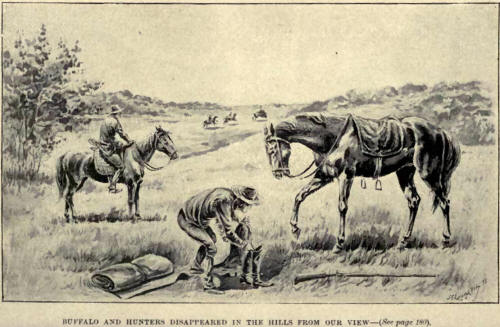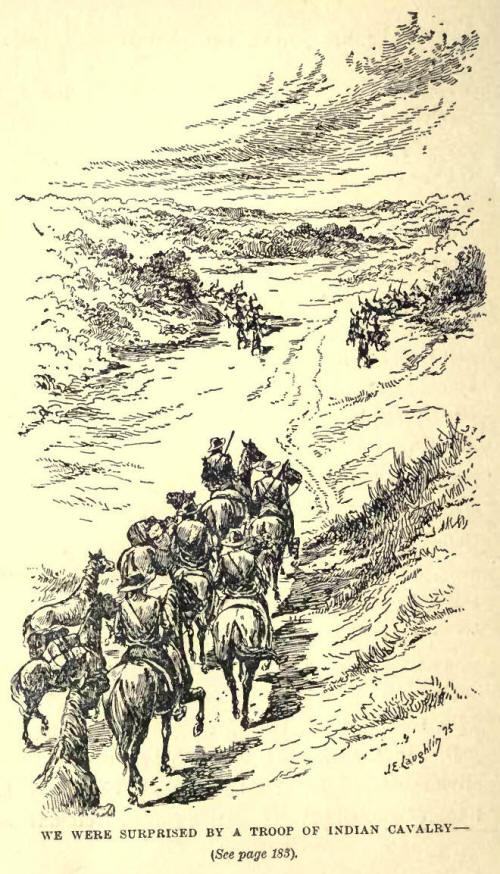|
I HAVE noticed that while
man's stomach seems to need a lot of stimulating, yet there are
circumstances when this organ, in turn, becomes a great stimulator; and the
slowest in our party seemed to me to feel this that day, and we rode
steadily and fast.
South-east was our course
into the big bend of the Battle River.
In the afternoon we did sight
a buffalo. There he stood in his hugeness and ugliness, on a plain, without
any cover.
The only way was to run him;
so father and Peter made ready for the race.
Father was tremendously
excited, and rushed around like a boy, pulled off his big riding-boots and
left them on the prairie, then threw down his coat, untied his waterproof
from his saddle and flung that down also, and putting on a pair of
moccasins, he vaulted into the saddle with all the spring and vigor of
youth, and rode off with Peter towards the bull, who presently noticed them,
and lifting up his big, shaggy head, snuffed the air, and pawed the ground,
and then started.
His legs seemed to have no
bend in them, and his gait at first was slow, but as the horses came near on
the dead run his gait increased in speed. As he ran he turned his head from
side to side to catch a glimpse of his pursuers.
At first I thought I could
catch him on foot; then he spurted, and the hunters drove their horses to
their best. Still the brute was too far ahead for them to shoot, and thus
buffalo and hunters disappeared in the hills from our view, and, after them,
William; only our pack-horses, and Mr. Woolsey and myself, were left.
I gathered up what remained,
boots, coats, etc., tied them to my saddle, and we followed slowly at Mr.
Woolsey's pace.

"We are lost, John. We may
never find our friends again." These were the comforting sentences Mr.
Woolsey addressed to me, but I thought otherwise, and said so, and comforted
my venerable companion, all the while keeping my eye on the spot where I had
last seen our friends disappearing.
On into the rolling hills we
rode, and I did wish Mr. Woolsey would come faster. Repeatedly he broke out
about our big loss. Then I heard voices, and we came up to our hunters and
found them skinning the buffalo. Taking some of the meat, we pushed on.
And now the whole country
gave signs that recently large herds had been roaming and feeding here, and
our guide said we might strike the Indians very soon.
But it was not until Tuesday
afternoon we came to a large trail; indeed, to many large trails, for these
paralleled each other. Thus the large camp kept in a compact mass, which was
wise, as the enemy was always on the lookout for stragglers, and as our
party was small, we were constantly on the watch against surprise.

But in the early afternoon,
notwithstanding all our watchfulness, we were surprised by a troop of Indian
cavalry dashing at us from out of the bluff on one side, and another from
the other side.
With whoops and yells and
fine horsemanship they bore down upon us, and I did not know what to think
for a while. But Peter did not seem to mind them; he only sat his horse
straighter than before, and soon I knew these were friends sent out to
escort us into camp.
Then, as we kept on the
trail, presently we saw a flag, and coming up over the hill a small body of
riders, and in the centre a "kingly- looking man."
"That is Maskepetoon," said
Mr. Woolsey. We alighted as we met, and the chief, addressing the Deity,
expressed his thankfulness because of father's coming, and invoked a
blessing on our meeting. They all shook hands, and in company with the chief
and escort, we continued on our way to the camp.
I was taking stock of the
Indians around us, as also of their horses. The men were fine specimens
generally, a large percentage very good-looking; their costumes were varied
and unique, and ranged from a breech-cloth and looking-glass on to
perforated leather shirts and leggings. Also fancy-colored calico was common
for little shirts, which were not more than waists, and the sleeves of which
came a little past the elbow. Most of the young men had their hair "banged,"
and I believe that fashion, now so common everywhere, originally came from
the plains. Most of them had brass pendants hanging from the hair and ears,
also brass collars and armlets. Some had sea-shells on their necks. All were
armed with either bow and quiver or flint-lock guns; nearly all were
painted, red, yellow and blue being the chief colors, red predominating.
The saddles were
home-made—some with a bone and wood frame, covered with rawhide; others a
pad of dressed leather, stuffed with moose or deer hair. Stirrups were wood,
covered with rawhide; stirrup leathers and girths were softened rawhide.
Saddle-cloths were homemade, consisting of the skins of hear, wolf, dog,
buffalo, etc., and trimmed with strips of red and blue Hudson's Bay strouds
(a strong kind of cloth made for this trade).
Horses were of all colors and
sizes, some very smart and frisky, and many of them exceedingly handsome.
The whole scene was harmonious and picturesque, and highly interesting to
me. All my previous life had been spent among Indians, but they were canoe
men, and wood hunters, and fishermen, and for some generations at peace.
Here were plain hunters, and buffalo Indians, and warriors. Some of these
rode horses recently taken from the enemy. Some of them wore scalp-locks
dangling from arm or leg, which not many moons since were the pride of the
original owners, and on whose heads they had grown. But as I took in these
new surroundings, we were approaching the camp, and the crowd around us had
increased.
Many more men had, ridden out
to meet us, and crowds of boys, two and three on one pony, were joining our
cortège all the while.
So far as I could see, the
ponies were as full of fun as the boys.
Many of the latter were
naked, except for the paint and brass ornaments and beads with which they
were bedecked. |
